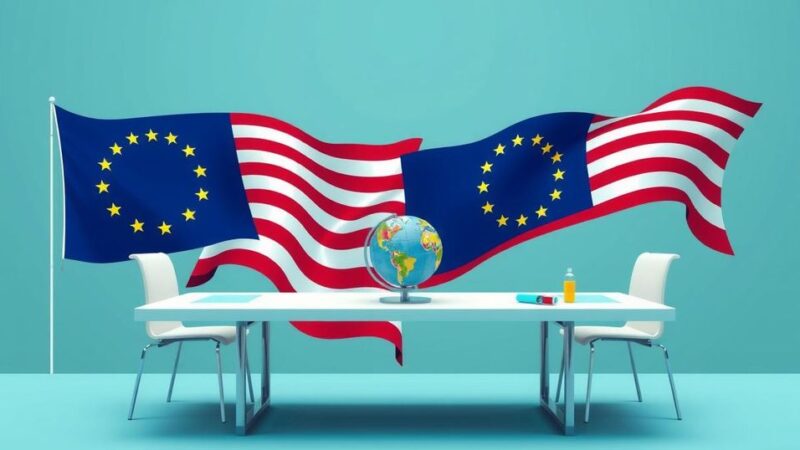President Trump proposed lowering China’s tariffs to 80% before trade talks in Geneva. U.S. Treasury Secretary Scott Bessent will meet with China’s Vice Premier this weekend. Despite ongoing tensions, a recent agreement with Britain signals negotiations are underway. The market shows optimism amid these developments.
U.S. President Donald Trump hinted at a possible reduction of tariffs on Chinese imports ahead of upcoming trade negotiations in Geneva this weekend. Writing on his Truth Social platform, he suggested that an 80% tariff on China might be more appropriate, down from the current 145%. Some products see duties soaring to an impressive 245%. This announcement adds another layer to the ongoing trade dynamics between the U.S. and China.
Trump’s comment also referenced U.S. Treasury Secretary Scott Bessent, who will be meeting with China’s Vice Premier He Lifeng during the talks. This weekend’s discussions aim to de-escalate rising tensions affecting global markets. The U.S. Trade Representative, Jamieson Greer, is also expected to join these negotiations. However, Trump did not clarify if he envisions this 80% tariff as the final target or merely a temporary measure.
The trade war has prompted China to impose its own hefty 125% tariffs on U.S. goods in response to American tariffs. Experts are watching the unfolding dialogues closely. Xu Bin, a professor at the China Europe International Business School, emphasized that the mere act of conversation is crucial, given that China is the lone participant retaliating against Trump’s tariffs.
China continues to assert that its stance is unchanged, demanding that the United States lift tariffs first before any significant trade discussions can proceed. Meanwhile, Bessent remarked that the focus of the talks would be on easing current tensions rather than striking a monumental new trade deal.
Ngozi Okonjo-Iweala, head of the World Trade Organization, expressed her support for the Geneva meetings, calling them a positive move toward reducing trade tensions between the two economic powerhouses. She stressed the importance of ongoing dialogue to mitigate risks of geopolitical fragmentation and to foster global economic stability.
Josh Lipsky from the Atlantic Council, however, tempered expectations, suggesting that major breakthroughs might not emerge from these negotiations, beyond a better grasp of each party’s negotiating stance.
These talks follow Trump’s announcement of what he labeled as a historic trade agreement with Britain—the first formal deal since implementing sweeping tariffs globally. The five-page document, while not legally binding, eases fears among investors by signaling the U.S. willingness to negotiate specific tariff relief, including on British cars and metals in exchange for U.S. agricultural products.
Despite the agreements, a 10% baseline tariff on many British goods remains imposed, with indications that other nations could face even stiffer tariffs, especially those with trade surpluses with the U.S. Trump proclaimed the British deal as just the beginning, expressing hope for similar dialogues with the EU and China down the line.
On the markets side, the prospect of easing tensions buoyed major stock indexes. U.S. stock prices rose in early trading, while all major European markets enjoyed positive momentum after a mixed performance across Asia.
In summary, President Trump has suggested potentially lowering tariffs on Chinese imports to 80% just before crucial trade talks with China in Geneva. The U.S. Treasury Secretary will meet with Chinese officials in an effort toward de-escalation of trade tensions. Meanwhile, a new trade agreement with Britain indicates ongoing negotiations. The market is reacting positively, although analysts urge caution about expectations from the upcoming talks. Sustained dialogue is regarded as a necessary step to navigate the complexities of global trade relations.
Original Source: www.tiogapublishing.com






